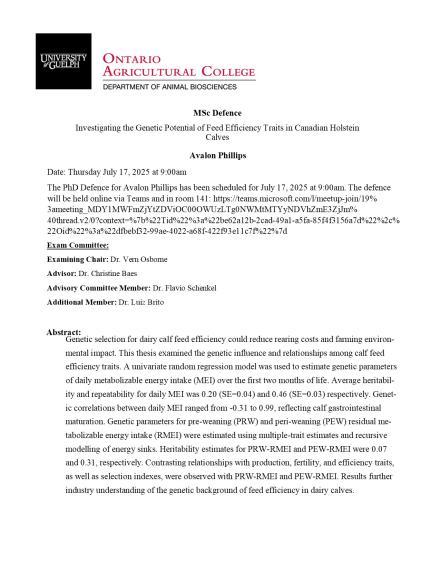Avalon Phillips - MSc Defence
Date and Time
Location
The defence will be held online via Teams and in room 141: https://teams.microsoft.com/l/meetup-join/19%3ameeting_MDY1MWFmZjYtZDViOC00OWUzLTg0NWMtMTYyNDVhZmE3ZjJm%40thread.v2/0?context=%7b%22Tid%22%3a%22be62a12b-2cad-49a1-a5fa-85f4f3156a7d%22%2c%22Oid%22%3a%22dfbebf32-99ae-4022-a68f-422f93e11c7f%22%7d

Details
Investigating the Genetic Potential of Feed Efficiency Traits in Canadian Holstein Calves
Genetic selection for dairy calf feed efficiency could reduce rearing costs and farming environ-mental impact. This thesis examined the genetic influence and relationships among calf feed efficiency traits. A univariate random regression model was used to estimate genetic parameters of daily metabolizable energy intake (MEI) over the first two months of life. Average heritabil-ity and repeatability for daily MEI was 0.20 (SE=0.04) and 0.46 (SE=0.03) respectively. Genet-ic correlations between daily MEI ranged from -0.31 to 0.99, reflecting calf gastrointestinal maturation. Genetic parameters for pre-weaning (PRW) and peri-weaning (PEW) residual me-tabolizable energy intake (RMEI) were estimated using multiple-trait estimates and recursive modelling of energy sinks. Heritability estimates for PRW-RMEI and PEW-RMEI were 0.07 and 0.31, respectively. Contrasting relationships with production, fertility, and efficiency traits, as well as selection indexes, were observed with PRW-RMEI and PEW-RMEI. Results further industry understanding of the genetic background of feed efficiency in dairy calves.